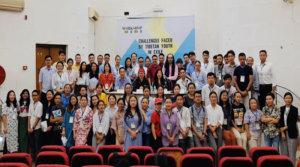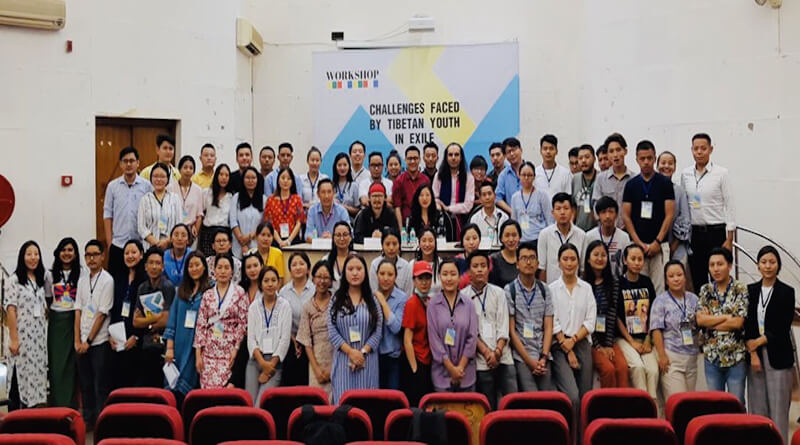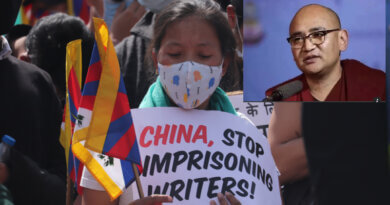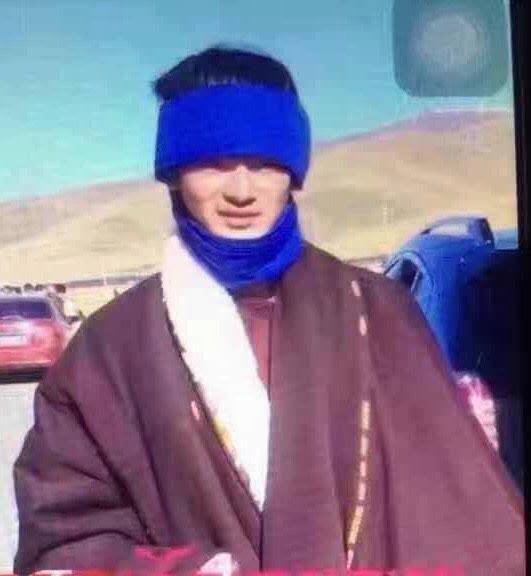Challenges Faced by Tibetan Youth in Exile: A Report on the Workshop (2019)

DHARAMSALA, 29th July: The workshop on Challenges faced by Tibetan Youth in Exile (19th-20th July) and the conference on Centrality of the Marginalised: Tibet, China and India (22nd July) took place in School of Social Sciences 1 Auditorium of Jawaharlal Nehru University and in Gulmohar hall of India Habitat Centre respectively. This initiative was executed in collaboration with the University of Westminster and Tibet Forum- JNU. Around sixty (60) participants and twelve (12) expert speakers participated in the workshop and thirteen (13) expert speakers were invited for the conference. A considerable number in the participants were students pursuing various degrees in different universities of India.
The first introductory note was given by Professor Dibyesh Anand from University of Westminster. He stressed on the importance of Tibetan people becoming equal producers of knowledge and not always being at the receiving end of this chain of knowledge. A workshop which specifically focuses on Tibetans living in exile will be one of the starting points which would be able to discuss the precarious situation the exile inhabits. Professor reiterated the need to learn from each other and to speak a shared language in hope to become an inclusive society where people listen to each other. It is a hope that initiatives like these help us to overcome difficulties and have fruitful discussions around it.
The first session of the workshop began with a roundtable discussion on Academia and Activism: Merge and Divergence factors chaired by professor Anand. Tenzin Tsundue (Poet and Activist), Jigme Yeshi (Assistant Professor, Department of Political Science, University of Calcutta) and Lobsang Yangtso (Research and Campaign Assistant at Tibet Third Pole, ITN) initiated the discussion surrounding the academia and activism debate. For Tsundue, art is a very important avenue through which our intellectual inquiry can be understood. He insisted that we have to break stereotypes, resist unquestioned notions about Tibet’s historicity and current narratives. The need to popularise, standardise and challenge the master narratives and divergences is a must. He stated that it is important to familiarise oneself with the struggles of resistance since we do not have the dignity to live in our home. Dr. Lobsang Yangtso started with a distinction where activism stands for social change and academia produces knowledge about the subject. Dr. Yangtso invokes Noam Chomsky as he always asserts that it is the responsibility of intellectuals to bring about change as research is also taken by activists who are actively involved in a resistance. She speaks from experience when she mentions that silencing ‘radical’ tactics in academia is prevalent when one gets involved in activism. Dr. Jigme Yeshi invokes the Gramscian idea of a ‘civil society’ which is an important component for major transformation. It is a war of position, a counter-hegemony where language is missing. It inspires autonomous standing and becomes a convergence in academia and activism where we try to comprehend new languages which we continuously forget. He also invokes great scholars like Noam Chomsky, Michel Foucault and the great philosopher Gendun Choephel to reassess their work through their activism and their pursuit for social change against the difficult odds of their times. This roundtable discussion was followed by interjections from professor Anand and a series of questions from the audience.
The next session that followed was the break-out session where all the participants were put into three different groups to discuss issues and concerns about educational institutions and its benefits and pitfalls. The respective groups raised concerns about scholarships, challenges and opportunities in Tibetan schools, demographic changes in TCV and Homes, hostels for college students, etc. All the respective representatives from education sectors were present during their presentations. The three expert speakers were Namgyal Yamphel (Director, STSS), Tenzin Dargyal (Head Office, TCV) and Karma Chungdak (Director, Homes Foundation). They confronted the doubts and concerns the participants had put forward during their presentations and also made their case by clarifying complexes that one finds with working within an institution. The speakers maintained a conversational tone in order to respond to the questions raised during the presentations. This was followed by a very long discussion including individual grievances and other curiosities about the system at work.
The second day of the workshop started with an introductory note by Tashi Yangzom, an executive member of Tibet Forum- JNU. The first session of the day began with the break-out session where the groups discussed Human Rights’ challenges regarding legal status of the refugees, documentations, settlement issues, etc. The groups brainstormed and brought forth concerns about legal challenges in pursuing higher education, jobs and scholarships, and legal challenges concerning political activism were also discussed. Legal experts Colin Gonsalves (Founder, Human Rights Law Network (HRLN) & Senior Advocate, Supreme Court of India), Faisal Abdali (Migration Law Expert, HRLN) and their Olivia Bang were present during these presentations and they tried to clarify the doubts and concerns in their following session. The panel started the discussion in an interrogative manner to make sure that the participants were aware of their legal rights by the virtue of law imprinted in the Constitution of India. They encouraged the Tibetans to speak up when they are wronged by the law or the government of India. They even extended their helping hand by inviting the participants to volunteer at their firm if anybody wanted.
The second session of the second day was the roundtable discussion on Tibetan Civil Society: Challenges and Opportunities which was moderated by Lhakpa Tsering Lak (Programme Manager for Kun Kyong Charitable Trust and Tsurphu Labrang of the 17th Gyalwang Karmapa). The expert speakers were Sherab Woeser from Tibet Fund, Kaysang from Drokmo and Tenzin Choekyab from Jangsem Youth Club. They shared their experiences from where they first started. The problems concerning logistics, funding and support were shared by all the presenters. They came up with instances and scenarios that helped them reshape their respective organisations. This panel was able to grasp the attention of young Tibetans and even encouraged them to start up their own initiatives like these to help the general public. This discussion was followed by a set of questions from the participants that placed important concerns such as accountability, mobilisation for the members of the organisation, policy strategies, etc., for the panel.
The last session was a workshop on Activism where three simultaneous sessions were conducted and the participants chose their respective themes: Media Training by Jigdal (International Tibet Network), Campaign Planning by Tenzin Tselha and Rinzin Choedon (Students for A Free Tibet) and Online Security by Thayai and Dorjee (Tibet Action Institute).
The first day of the workshop was designed to outline the challenges faced by the Tibetan institutions at work and how they impact Tibetans in exile. It tried to assess the problems faced by educational institutions while dealing with their students. The first break-out session and the following panellists aimed to bridge the gap between the two parties involved. The second day of the workshop was designed to chart out larger refugee and legal problems in order to create awareness about the ongoing challenges that Tibetans face. The break-out session and the following panellists tried to make the participants familiar with the bureaucracy of the legal world only to make clear the rights that Tibetans are entitled to. The last roundtable discussion on ‘Tibetan Civil Society’ was an attempt to encourage the participants to envision a way forward in the making of our community and to ensure a possibility that we as a people are capable of making change.
Submitted by:
Choekyi Lhamo
MA CES, JNU
Executive member, Tibet Forum- JNU






